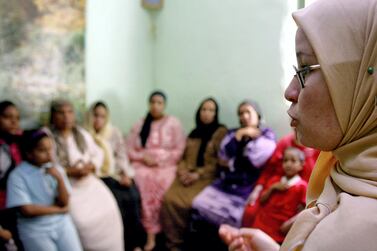A retired doctor and the parents of a girl, 12, who died after female genital mutilation surgery are to stand trial in Egypt, with child rights campaigners calling for them to receive jail terms to deter others from the illegal practice.
Last weekend, Egypt's Prosecutor General Hamada El Sawy ordered the referral of the trio to the criminal court.
Abdel Fadeel Rashwan and the parents of Nada Hassan Abdel-Maqsoud were arrested last month after her death at a private clinic in Manfalut, near Asyut in southern Egypt, but were released on bail, causing public outrage.
"It is a serious step towards putting the defendants behind bars," said Randa Fakhr El Deen, executive director of the NGOs' Union Against Harmful Practices on Women and Children.
She said she hoped a tough sentence would discourage other cases of FGM.
Genital cutting of girls was banned in Egypt in 2008 but a 2016 survey by the UN's children's fund found 87 per cent of women and girls aged between 15 and 49 had undergone the ritual, which typically involves the partial or total removal of the external genitalia.
In 2016, the practice was banned, meaning doctors who performed the procedure could be jailed for up to seven years and anyone requesting the operation face sentences of up to three years.
But activists say the law has not been strictly enforced and the few people found guilty tend to receive light penalties.
World leaders have pledged by 2030 to eradicate FGM, which can cause long-lasting mental and physical health problems, but campaigners say the practice was deeply entrenched in many places.
An investigation conducted after the arrests last month revealed the child's parents wanted their daughter cut and the doctor, about 70, conducted the surgery on their request.
Prosecutors said the operation lasted about 30 minutes and left the girl unconscious. Efforts to revive her failed.
Most genital cutting in Egypt is carried out by doctors and nurses at private clinics, with the rest done at home, according to the Egypt Demographic and Health Survey of 2014.
But prosecutors said the hospital where the girl died had not held a licence since August 2016, was ill equipped and its operation room did not meet the terms for combating infection.
Mr El Sawy called on parents not to expose their daughters to dangerous practices linked to obsolete customs and traditions.
"Be aware that their purity and chastity will not exist but through their good upbringing, embracing them and their enlightenment," he said.






